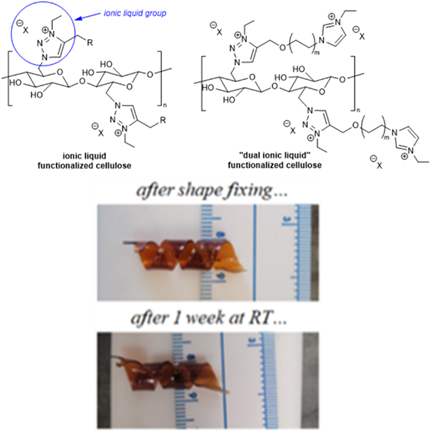
|
Top - The initial shape-fixing ratio of the cellulose polymer.
Bottom- The shape-recovery ratio of the cellulose polymer after one week at room temperature.
|
Invention Summary:
Sustainable materials have become attractive to reduce carbon footprint. Cellulose is a biobased material that is renewable and economical. Recent discoveries in films constructed from cellulose-based materials have demonstrated shape‐memory behavior and electro-spinning leading to applications in reusable sensors, flexible batteries, electroactive fibrous mats and/or masks.
Rutgers researchers in collaboration with Murray State University have created a novel electroactive material, utilizing cellulose as a building block which is manufactured by electrospinning of fibrous mats (ion-containing fibers, textiles) or in the formation of thin films (sensors, membranes). The addition of multiple ionic groups can improve the mechanical and morphological characteristics of cellulose.
Market Applications:
- Fabricate membranes for batteries.
- Flexible electronics and sensors.
- Food and skin chemical additives.
Advantages:
- Greater conductivity.
- Inexpensive and renewable.
- Increased flexibility, mechanically robust, and shape memory behavior.
Intellectual Property & Development Status: Patent pending. Available for licensing and/or research collaboration. For any business development and other collaborative partnerships contact: marketingbd@research.rutgers.edu